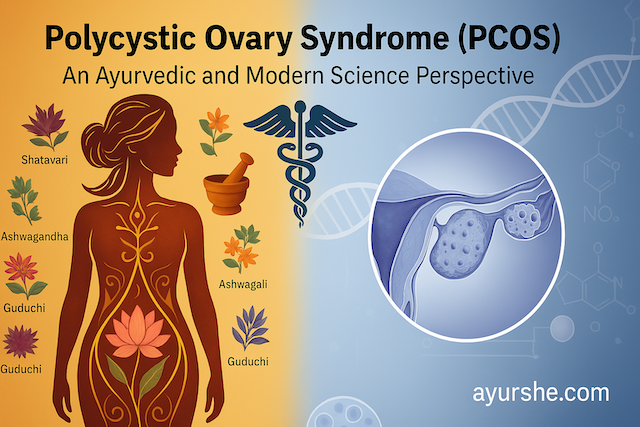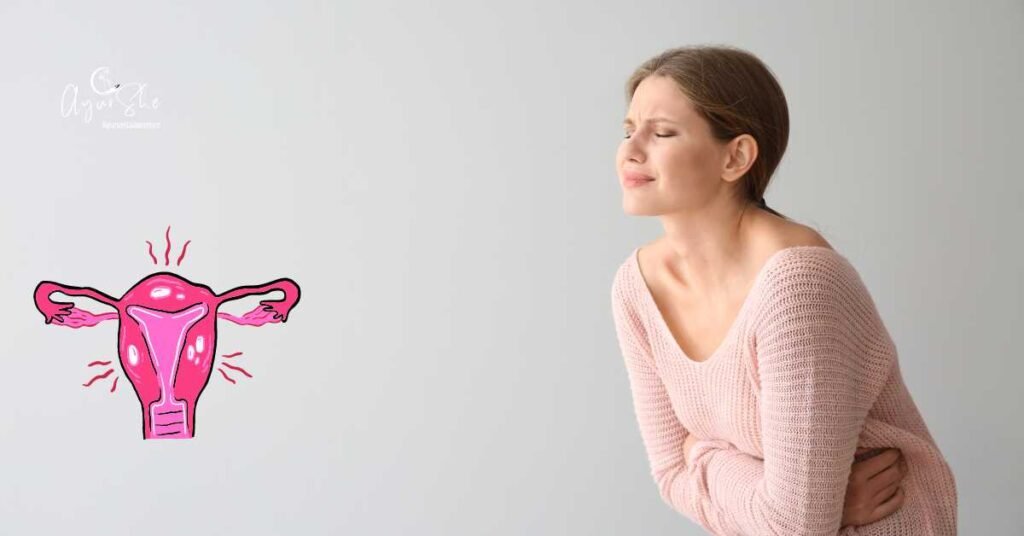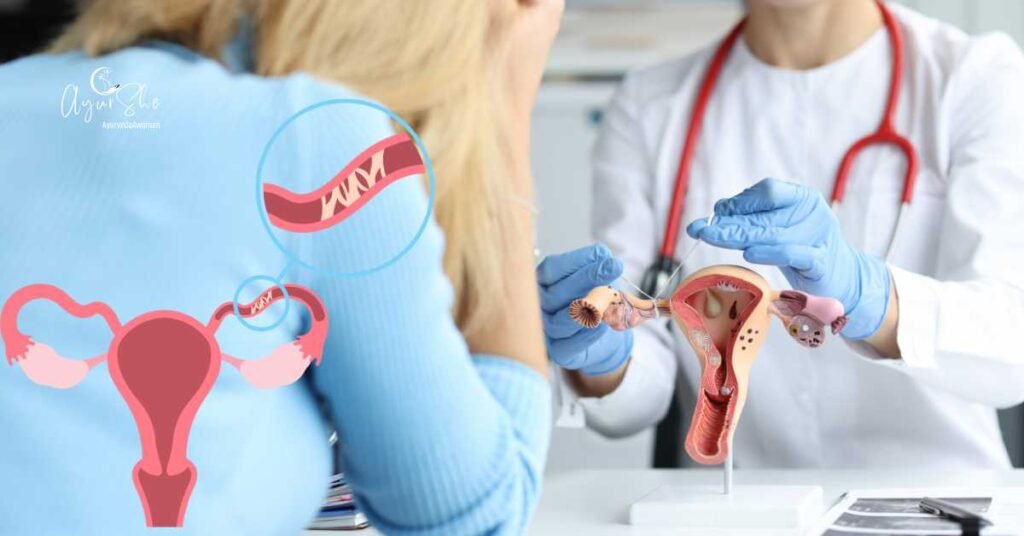Introduction
Polycystic Ovary Syndrome (PCOS) is one of the most common endocrine and gynecological disorders affecting women of reproductive age (15–40 years). Globally, it affects 1 in 10 women, making it a major cause of irregular periods, infertility, obesity, acne, and emotional distress.
While modern science explains PCOS through the lens of hormonal imbalance, insulin resistance, and genetic predisposition, Ayurveda views it as a doshic imbalance—primarily Kapha and Vata—affecting Artavavaha Srotas (channels responsible for menstruation and ovulation).
This article presents a comprehensive review of PCOS through Ayurvedic principles correlated with modern medical evidence, along with holistic treatment approaches.
Understanding PCOS in Modern Medicine
🌐 Definition
PCOS is a hormonal disorder characterized by:
- Hyperandrogenism (high male hormone levels)
- Chronic anovulation (irregular ovulation/periods)
- Polycystic ovaries (multiple small cysts seen on ultrasound)
🔎 Key Features
- Irregular menstrual cycles
- Excessive hair growth (hirsutism)
- Acne and oily skin
- Obesity or difficulty losing weight
- Infertility
- Mood swings, anxiety, depression
🧬 Causes
- Genetic predisposition
- Insulin resistance → hyperinsulinemia → increased androgen production
- Hormonal imbalance: LH > FSH ratio
- Lifestyle: sedentary habits, junk food, stress, irregular sleep
📊 Modern Diagnostic Criteria (Rotterdam Criteria)
At least 2 of the following:
- Oligo/anovulation
- Clinical/biochemical signs of hyperandrogenism
- Polycystic ovaries on ultrasound
Ayurvedic Understanding of PCOS
📖 Classical References
Though PCOS is not described by name in Ayurveda, its clinical features resemble multiple conditions:
- Artava Dushti (menstrual disorders)
- Nashtartava (amenorrhea/oligomenorrhea)
- Yonivyapad (gynecological disorders)
- Bandhyatva (infertility)
🔥 Doshic Involvement
- Kapha Dosha: causes cyst formation, obesity, sluggish metabolism
- Vata Dosha: disturbs Apana Vata leading to irregular flow, infertility
- Pitta Dosha: causes acne, inflammation, mood changes
🌀 Pathogenesis (Samprapti)
- Kapha obstructs Artavavaha Srotas
- Vata is vitiated → irregular ovulation
- Pitta imbalance contributes to metabolic and emotional disturbances
Correlation Between Ayurveda & Modern Science
| Modern Factor | Ayurvedic Correlation |
|---|---|
| Insulin resistance | Kapha aggravation & Medo Dushti (fat tissue imbalance) |
| Irregular ovulation | Vata vitiation in Apana Vata |
| Hyperandrogenism | Pitta imbalance leading to excess heat & acne |
| Cystic ovaries | Kapha-induced srotorodha (channel blockage) |
| Obesity | Kapha-Prakopa & Medoroga |
| Infertility | Bandhyatva due to Artava Dushti |
Ayurvedic Management of PCOS
🌿 1. Shodhana (Detoxification)
- Vamana (therapeutic emesis) → for Kapha-dominant PCOS
- Virechana (purgation) → for Pitta dominance
- Basti (medicated enema) → to regulate Apana Vata
- Raktamokshana (bloodletting) in severe acne/hirsutism
These therapies must be done under qualified Ayurvedic supervision.
🌿 2. Shamana (Palliative Therapy)
Herbal remedies to balance doshas:
| Herb | Benefits | Form & Dosage |
|---|---|---|
| Shatavari (Asparagus racemosus) | Balances hormones, nourishes reproductive tissues | 3–6 g powder with milk daily |
| Guduchi (Tinospora cordifolia) | Regulates metabolism, balances Pitta & Kapha | 500 mg capsule twice daily |
| Ashoka (Saraca indica) | Normalizes menstrual flow | 10–15 ml Ashokarishta with water, twice daily |
| Triphala | Regulates digestion, clears Ama | 1 tsp powder at night with warm water |
| Lodhra (Symplocos racemosa) | Reduces Kapha-Pitta imbalance, tones uterus | 1–3 g churna with honey |
🌿 3. Rasayana (Rejuvenation)
- Chyawanprash – improves immunity and vitality (1 tsp daily)
- Phala Ghrita – enhances fertility and uterine health (1 tsp with warm milk)
🍽️ 4. Diet (Ahara) Recommendations
- Favor Kapha-pacifying diet: barley, millets, green leafy vegetables
- Avoid: refined carbs, dairy excess, oily/fried foods
- Use spices: turmeric, cinnamon, fenugreek, cumin, ginger
- Include: flax seeds, sesame seeds, bitter gourd
🧘 5. Lifestyle (Vihara)
- Yoga Asanas: Baddha Konasana, Bhujangasana, Dhanurasana, Surya Namaskar
- Pranayama: Anulom Vilom, Kapalabhati (for weight & insulin balance)
- Sleep hygiene: early bedtime, no screens at night
- Stress management: meditation, journaling, nature walks
Modern Medical Management
- Lifestyle modification: exercise + diet = first-line
- Oral contraceptives: regulate cycles, reduce acne
- Metformin: improves insulin sensitivity
- Clomiphene/Letrozole: for ovulation induction in infertility
- Surgery: ovarian drilling in resistant cases
Integrated Ayurveda + Modern Care Plan
- Short-term: Relief of symptoms (cycle regulation, acne, weight management)
- Long-term: Correct doshic imbalance, restore fertility, prevent diabetes & cardiovascular complications
- Combining yoga + diet + herbal medicine with modern diagnostic monitoring provides the best results.
Research Evidence
- A study in AYU Journal (2016) found that Triphala + Ashokarishta improved cycle regularity in PCOS women.
- Modern research shows Ashwagandha and Shatavari reduce cortisol and balance reproductive hormones.
- Yoga has been shown to reduce LH/FSH ratio and improve ovulation.
Conclusion
PCOS is a multifactorial condition requiring a comprehensive, personalized approach. Ayurveda offers profound insights into its root causes through doshic imbalance and provides safe, holistic therapies that complement modern science.
For working women, adopting Ayurvedic lifestyle routines, mindful eating, herbal support, and stress reduction alongside modern diagnostics offers a sustainable pathway to restore hormonal balance, reproductive health, and emotional well-being.





